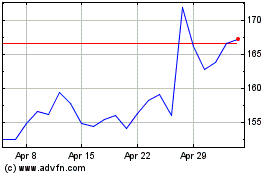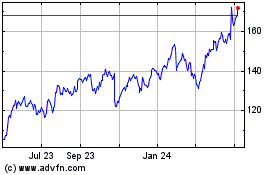By Sam Schechner
Google has long been one of the biggest drivers of new business
for travel websites like Expedia and Tripadvisor. Some of them say
the Alphabet Inc. unit is also a big competitive threat.
Berlin-based HomeToGo GmbH is an example of the bind facing many
travel businesses. The vacation-rental website depends in part on
Google to direct people to its service, but it says business has
been affected by the search company's placing a box of listings
from third-party travel sites atop many pages of search results for
vacation rentals.
In Google searches conducted this past summer, the rate at which
people clicked when HomeToGo was the top regular result fell as
much as three-quarters when Google's vacation-rental listings box
was present above, compared with when it wasn't, according to
calculations HomeToGo provided to The Wall Street Journal.
"Suddenly Google puts a less-good product more prominently above
everything, and you're thinking, 'Is this fair competition?'" said
Patrick Andrae, HomeToGo's co-founder and chief executive.
Critics like HomeToGo say that Google's travel boxes and other
kinds of specialized search products increasingly keep users within
the Google ecosystem, encouraging them to use Google products
rather than clicking to other sites to transact business.
Google says it sends a growing volume of traffic to other
websites and that, when it comes to travel information, its search
engine faces tough competition from travel sites. A spokeswoman
says Google developed new ways to display search results to satisfy
users' desire for quick access to helpful information. "Removing
these results would create a worse experience for consumers and
send less traffic to travel companies," she said.
As antitrust regulators on both sides of the Atlantic
investigate allegations that Google and other Silicon Valley giants
have leveraged their heft to squash competitors, one area of focus
is on the companies' alleged abuse of their role as internet
gatekeepers to punish or extract concessions from potential rivals,
according to people familiar with the matter.
The U.S. Department of Justice is moving toward bringing an
antitrust lawsuit against Google, potentially in the coming days,
the Journal has reported. Google's search practices are likely to
be a key focus of such a lawsuit, the Journal report said, citing
people familiar with the matter.
The European Union's top antitrust authority has issued Google
more than $9 billion in fines, in part following allegations by
shopping websites that say Google pushed down their search results
with its own box of product ads. Google has appealed those
decisions. EU officials have said investigators are now looking
into the company's use of data and have received complaints from
companies including HomeToGo.
Google says its products, including the search boxes, benefit
both consumers and other businesses. In a blog post on competition
issues, the company says its "products increase choice and expand
competition" and "level the playing field for small businesses
everywhere."
Travel agents and aggregators have long depended on Google to
build their businesses, and collectively spend billions of dollars
a year advertising their services on the search engine. But for
almost as long, travel companies have been complaining -- at times
to competition regulators -- that Google has been muscling unfairly
onto their turf.
Google launched a flight-search tool in 2011, after buying a
travel-software company. Later, it began adding hotel-search and
booking tools. In 2018, the company started including vacation
rental listings in its own booking tools, and split them into
separate search-results boxes last year. Google's hotel listings
are paid ads; vacation-rental listings are currently free.
Last fall, Tripadvisor Inc., Expedia Group Inc. and Booking
Holdings Inc. blamed Google's new hotel-search functions for
siphoning away traffic the companies receive through free links in
Google's organic search results. The companies declined to
comment.
"Google has gotten more aggressive," Tripadvisor Chief Executive
Stephen Kaufer said during an earnings call at the time.
Google has said its product changes benefit travel
businesses.
Founded in 2014, HomeToGo has built a business by aggregating
listings from other vacation-rental sites, as well as directly from
some property managers. Google search was an important component of
building the company, in part with ads, but also with website
improvements that enabled it to climb Google's search rankings.
Because many travel searches start with Google, Mr. Andrae said
travel sites have "a certain reliance on Google."
Mr. Andrae said he saw a danger to HomeToGo's business when
Google launched its tool to search vacation-rental listings. The
company was still seeing increased traffic, but executives believed
the Google tool cost it potential growth. In March 2019, HomeToGo
filed a complaint to the European Commission, the EU's top
antitrust regulator, alleging that the tech company was abusing its
dominance.
James Burrows, chief executive and co-founder of Rentals United,
a Barcelona-based company that makes software for listing
short-term rental properties on travel sites, said that Google will
"potentially break up the hold" of some travel-booking companies.
"More competition and more diversity in selection are positive
things," he said.
Some vacation-home providers say they have been hurt by Google's
new way of displaying search results. Christi Kapp, who runs the
Kapp and Kappy B&B in Kissimmee, Fla., with her husband, said
that direct traffic to her website and direct bookings have fallen
significantly since Google's hotel-finder tool started appearing
alongside regular search results. In the past four weeks, of the 29
Google searches for her B&B's exact name, only four resulted in
a click on her website, she said.
Ms. Kapp attributed the decline to the appearance of Google's
hotel-finder tool, which sends users to book via online travel
agents. Ms. Kapp pays a commission on each booking through the
travel agents, something she doesn't have to do if people click
directly on her website.
"It's like paying for the right to walk on the road," Ms. Kapp
said. "The phone book didn't take a cut of your business."
At the Journal's request, HomeToGo quantified the effect of
Google's listings box, using data the search company supplies to
website owners as well as outside monitoring from a
search-analytics company.
For search queries between June and September where HomeToGo was
the top regular result on desktops, users clicked through to the
vacation-rental site 7.82% of the time; when Google's
vacation-rentals box was displayed atop search results, users
clicked through 2.98% of the time. Overall, HomeToGo estimates that
its traffic from regular Google searches is at least 20% to 30%
lower than it would be if Google weren't inserting its
vacation-rental boxes.
Mr. Andrae said he was ambivalent about seeking inclusion in
Google's vacation-rental search tool because he would have less
control over his users' options and booking experience. But with
others participating, he said the company has had no choice. Since
2019, HomeToGo says, it has repeatedly asked to be integrated, but
the site hasn't yet been added.
Google says it is working on including listings aggregators like
HomeToGo in its travel tools, and expects to be able to do so in
coming months.
"You are to a certain extent forced to play by the rules of the
big guys, " Mr. Andrae said. "Otherwise you might lose out."
Write to Sam Schechner at sam.schechner@wsj.com
(END) Dow Jones Newswires
October 14, 2020 06:43 ET (10:43 GMT)
Copyright (c) 2020 Dow Jones & Company, Inc.
Alphabet (NASDAQ:GOOGL)
Historical Stock Chart
From Mar 2024 to Apr 2024

Alphabet (NASDAQ:GOOGL)
Historical Stock Chart
From Apr 2023 to Apr 2024
